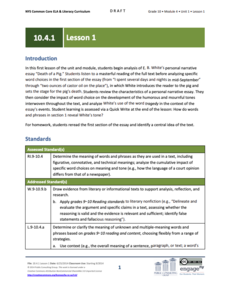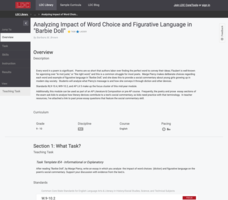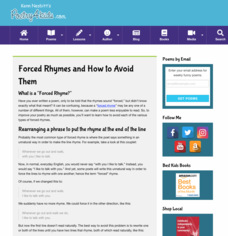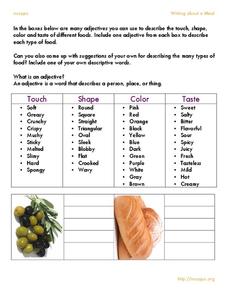Literacy Design Collaborative
Catching a Grenade: How Word Choice Impacts Meaning and Tone
Beyonce's "Halo" and Bruno Mars' "Grenade" provide eighth graders with an opportunity to consider how a writer's choice of words can create a very different tone even when the subject is the same. After a close reading of both lyrics,...
EngageNY
Comparing Meaning and Tone: The Fall of Saigon in Fiction and Informational Text
Who's that talking to? Readers listen to a reading of the "Forgotten Ship" transcript and answer questions focusing on word meaning and choice. They complete a chart to track the multiple narrators in the script. For homework, readers...
EngageNY
End of Unit Assessment: How Word Choice Contributes to Tone and Meaning
It's finally time for pupils to show what they know! Scholars finalize the unit with an end-of-unit assessment. They use the book Inside Out & Back Again and the "Forgotten Ship" transcript to examine word choice, tone, and...
EngageNY
Grade 10 ELA Module 4: Unit 1, Lesson 4
High schoolers read the final section of E. B. White’s Death of a Pig and examine the impact of the words and tone he used. In pairs, learners discuss their homework from the previous night, answer questions about the text, and write in...
EngageNY
Grade 10 ELA Module 4: Unit 1, Lesson 3
Are authors also designers? Scholars examine closely how E.B. White designs a section in Death of a Pig. They determine how the structure of sentences and paragraphs, the order of events, and the dialogue placement all contribute to the...
EngageNY
Grade 10 ELA Module 4: Unit 1, Lesson 1
Scholars evaluate E.B. White's tone in his narrative. Lessons use turn-and-talk strategies to discuss details of a personal narrative essay, respond to guided questions, and work in pairs to analyze word choice. Learners demonstrate...
Literacy Design Collaborative
Analyzing Language through Dialogue and Internal Monologue in "The Scarlet Ibis"
James Hurst's short story "The Scarlet Ibis" provides eighth graders with an opportunity to sharpen their literary analysis skills. After a close reading of the text, class members highlight and annotate parts of the dialogue and...
Literacy Design Collaborative
Analyzing Impact of Word Choice and Figurative Language in "Barbie Doll"
After a close reading Marge Piercy's poem "Barbie Doll," class members craft an AP®-style explanatory essay in which they analyze the diction and other figurative literary devices the poet employs to deliver her commentary on modern...
Poetry4kids
Forced Rhymes and How to Avoid Them
Ready to take your poetry writing to the next level? Use an independent lesson to iron out all those forced rhymes, wrenched rhymes, and near rhymes from first-draft poems.
University of North Carolina
Sciences
Science writing follows many of the same principles as writing in language arts, but some structural details differ. Individuals read an online science handout that covers how to write with precision, choose appropriate details, and use...
University of North Carolina
Word Choice
Words matter, particularly in academic writing. Issues such as vague language, wordiness, and cliches make it difficult to get a point across. Part of a larger series to improve writing skills, the handout on word choice shows writers...
University of North Carolina
Clichés
When it comes to writing, cliches are as old as dirt. A handout on tired phrases provides examples of cliches, as well as a description of the negative effects they have on a paper. Writers discover specific words and phrases to avoid,...
Nosapo
Writing about a Meal
You don't need to be a food critic to describe your meal accurately! A series of activities introduce learners to vivid adjectives when writing about the taste, smell, and feel of food. After working with word choice, parts of a...
Prestwick House
Connotative vs. Denotative Meanings
Besides the dictionary definition, words also carry the added weight of meanings that are inferred or implied, meanings conferred on words, or connotations. To gain an understanding the importance of connotation, class members engage in...
Fluence Learning
Writing About Literature: What Is Happiness?
Jack London's heart for adventure has come to define the spirit of America and its frontier. Selected passages from the foreword The Cruise of the Snark take eighth graders through London's construction and voyage of his ship before...
Scholastic
Choose Your Words Wisely (Grades 9-12)
Words, words, words. The function of words in persuasive writing is the focus of a group activity that asks members to analyze how words advertisers use are designed to influence targeted audiences.
EngageNY
Grade 9 ELA Module 4, Unit 1, Lesson 8
In a close reading of "The Overseer" chapter from Sugar Changed the World, groups focus on the words Aronson and Budhos use to contrast the lifestyles of enslaved people and their enslavers. The whole class then engages in an...
Museum of the Moving Image
Understanding the Language of Political Ads
The verbal techniques and emotional appeals contained in the language used in political ads plays a vital role in creating the impact of the ad. As class members continue their study of Presidential campaign commercials from 1952–2012,...
E Reading Worksheets
Tone Worksheet 2
The beauty of a poem is lost without an understanding of its tone. Middle schoolers connect author's purpose and word choice to four poems in a literary analysis activity, which prompts them to note each poem's tone and meaning.
EngageNY
Grade 9 ELA Module 1: Unit 3, Lesson 15
Where does Friar Laurence's loyalty lie? After listening to a reading of Act 4, scene 1, lines 89-126 of Romeo and Juliet, groups examine the details of Friar Laurence's plan.
EngageNY
Grade 9 ELA Module 1: Unit 3, Lesson 14
After watching the scene from Romeo + Juliet in which Juliet argues with her parents because she does not want to marry Paris, groups do a close reading of Act 4, scene 1, lines 44-88, examining the word choices in the conversation...
EngageNY
Grade 9 ELA Module 1: Unit 3, Lesson 13
Readers examine the conversation between Friar Laurence and Romeo in Act 3, scene 3 of Romeo and Juliet and consider how Shakespeare's word choices impact the development of Romeo's character.
EngageNY
Writing: Drafting Body Paragraphs and Revising for Language
Begin the drafting phase of the writing process with a lesson plan focused on logically writing three body paragraphs. Then, revise the writing to make it more formal after a teacher-directed mini-lesson plan. Each paragraph highlights...
EngageNY
Introducing “If” and Noting Notices and Wonders of the First Stanza
After reading chapter 14 of the story Bud, Not Buddy by Christopher Paul Curtis, scholars take part in a read-aloud of the poem If by Rudyard Kipling and compare it to the reading of Bud, Not Buddy. Learners then go deeper into the poem...

























